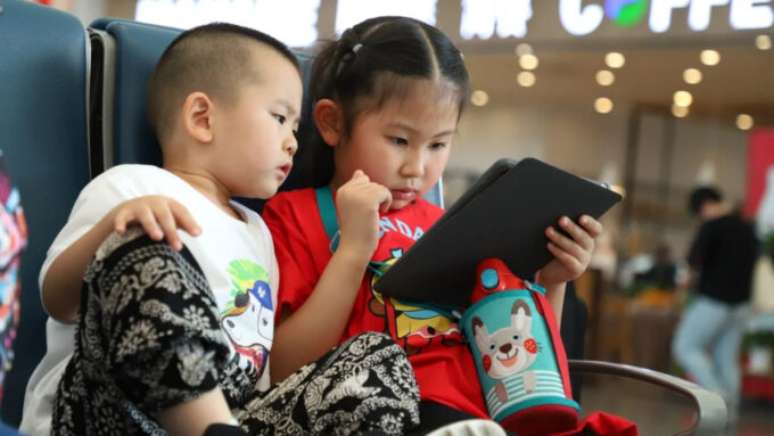Limit of 3 hours per week “solved” the problem of gambling addiction among minors, but the Chinese government wants to tighten the rules even more
A China in recent years has implemented severe restrictions on the consumption of digital content for all its citizens, focusing primarily on young people, in which it has classified social network apps and online games as “spiritual opium“. The blow, to force everyone to realign The vision of Premier Xi Jinping across the state, it landed heavily on the minds of studios, big tech companies, and the public.
One of the harshest rules, which limits minors’ access to online games to just 3 hours a week, has been devastating for several studios, which have lost rivers of money since it went into effect in 2021, but for the government the measure has not only been beneficial and will be maintained as further restrictions are to be implemented.
Beijing’s siege on local big tech began to lift in 2021, as the Communist Party of China, of which President Xi is also general secretary, began imposing heavy fines and prosecutions on companies that, while responsible for bringing much capital in the country, would have been at odds with the government’s philosophy, in which everyone, without exception, must work for the good of the nation.
Vague statements from executives such as then-Alibaba Group CEO Jack Ma in 2020criticizing the regulation as harmful to the market and innovation, it was interpreted by the government as a claim that the billionaires in the executive sector, who made their fortunes with Deng Xiaoping’s openness policy, have come to consider themselves untouchables .
The wave of lawsuits, fines and restrictions that followed sent a clear message that no one is above the state and the ursi-digo, Premier Xi, no matter how much wealth his companies generate for the country; Beijing was determined to force everyone back to the Party book, regardless of the huge amount of capital that would be – and indeed was – lost.
At the same time, the exaggerated use of social networks and online games by the Chinese population, especially by children and adolescents, is also not tolerated by Beijing. As the Party dictates, all adult citizens must work for the state in the first place, while minors are obliged to do so study a lot, in order to become productive individuals in the future. Parents also need to make sure their kids stay on track, lest they see their score on the social credit system Chinese fall.
Adults who abuse games and social media may be subjected to them compulsively ideological re-education, as these have no access restrictions, but children and adolescents are another story. Many social networking apps today have identification tools to ensure that minors do not log in outside of permitted hours, in-app purchases are blocked or restricted, and login time is also restricted.
The hardest blow has been dealt to online games: from 2021 minors can play online for a limit of 3 hours per week, only on Fridays, Saturdays, Sundays and holidays, and in a specific time slot, from 20:00 to 21:00 :00. This affected local and foreign companies alike, from Epic Games shutting down the local version of fortnitewhich didn’t even have microtransactions, to Microsoft removing LinkedIn from China.
Already Yahoo! completely shut down its activities in the Middle Country.

The consequences were clear: over 75% of the underage public followed the government’s recommendations in 2022 and the money they spent dropped exponentially. Companies like Tencent, which not only distributes its own games, but is also a preferential licensor for outside developers to distribute their games (local law prohibits foreign studios from directly publishing their games), have seen revenues drop significantly, but there is no other alternative.: it is to obey, or to obey.
From the government’s point of view, the changes have served their purpose. Ao Ran, general secretary of China Audio, Video and Digital Content Distribution Association, said at a conference held on Monday (13) in Guangzhou (Guangzhou), that teenagers are developing better use of self-control regarding their obligations, limiting themselves to Government mandated 3 hours of online gaming per week.
Ran also said that young people are more aware of the negative impacts of gaming and excessive digital content in their lives, but even so the restrictions imposed are a “long-term commitment”. Not only will they be maintained, but the government is considering tightening them further. How, nobody knows.
It is worth mentioning that the consumption of games has not necessarily decreased, as the measure only affects those that depend on the player’s online presence; so offline experiences don’t enter the equation. Second analyst firm Niko Partners, the number of underage gamers dropped from 122 million in 2020 to 83 million in 2022, a 36% reduction, but that’s still only true for connected experiences.
It’s possible that the next round of gaming restrictions will affect titles that don’t rely on a constant online connection to function, particularly PC and console titles; recently, the Chinese government has once again issued licenses for publishing games in the country, and no longer considers the media a drug, but “a medium of great importance for the industrial market and technological innovation” in China.
Source: South China Morning Post
China should increase restrictions on young people’s access to games
Source: Terra
Rose James is a Gossipify movie and series reviewer known for her in-depth analysis and unique perspective on the latest releases. With a background in film studies, she provides engaging and informative reviews, and keeps readers up to date with industry trends and emerging talents.




![Un Si Grand Soleil Preview: Episode Summary for Monday, October 20, 2025 [SPOILERS] Un Si Grand Soleil Preview: Episode Summary for Monday, October 20, 2025 [SPOILERS]](https://fr.web.img4.acsta.net/img/24/61/24614f00035a1444d216245e9a9c963f.jpg)

